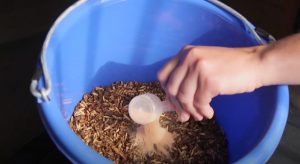Many different factors can affect a horse’s performance on race day, and one area that is often studied is electrolyte supplementation.
There is some evidence that electrolyte supplementation can help horses perform better in races. Studies have found that horses who are given electrolytes before a race ran faster than those who were not given electrolytes.
In this article we will discuss the evidence for electrolytes and how they can help a race horse run faster and longer.
What Are Electrolytes?
Electrolytes are minerals that dissolve in water and are necessary for many bodily functions, including hydration, muscle function, and nerve function. They are minerals that carry an electrical charge and help regulate the water in and around cells.
The most common electrolytes are sodium, potassium, chloride, and bicarbonate. Sodium and potassium are the most important electrolytes for horses because they are lost in large amounts through sweat. Chloride is also lost in sweat, but in smaller amounts. Bicarbonate is not lost in sweat, but it plays an important role in maintaining blood pH.
How Do Electrolytes Affect Race Horses?
Electrolytes are necessary nutrients that are needed for a horse’s digestion, fluid retention, nerve transmission, and muscular contraction. Almost every physiological process involves electrolytes.
This video should help understand the role of electrolytes in a race horse’s performance and overall health.
When horses sweat, they lose electrolytes along with water, which can lead to dehydration and electrolyte imbalances.
A proper balance of electrolytes in the blood allows a race horse to perform at optimum levels for longer. Electrolytes allow the horse’s muscles to contract and relax repeatedly, both in aerobic and anaerobic states.
If electrolyte balances drop below optimium levels, it reduces the ability for a horse’s muscles to contract and relax. The lack of electrolytes reduces the nervous system’s communications with the horse’s muscles, leading to reduced exertion levels and cramping. Just like a human athlete, losing electrolytes through sweat and metabolic processes can lead to decreased race performance.
On the other hand, if electrolyte levels are too high, it can lead to dehydration. The horse’s body naturally tries to rid itself of the excess electrolytes through urination. This causes fluid loss, which leads to lower cardio-muscular performance levels, since the blood cannot sweep away muscle byproducts as quickly. Excessive electrolytes can also lead to nervous system, GI tract irritation and kidney dysfunction.
Bottom line, it’s always best for a horse to have properly balanced electrolyte levels. Any imbalances will cause fatigue and reduced performance in horses.
Do Electrolytes Make Horses Faster in Races?
There is some debate among experts about whether or not electrolytes actually make horses faster in races. Electrolyte supplementation is often recommended for horses to help replace the electrolytes lost through sweating (i.e. after a hard workout or race) But a race horse is typically not physically stressed and sweaty at the start of a race.
Many trainers and owners give their horses electrolytes before a race in order to prevent dehydration and cramping. The theory is, during the race the horse’s body will consume enough electrolytes due to high exertion that this will lead to an imbalance late in the race.
Some studies have shown that electrolytes can improve performance in endurance activities, so it is possible that they could also help horses run faster in races. However, the benefits are unlikely to occur in short sprint races, and more likely in long endurance and steeplechase races.
Ways to Supplement Race Horse Electrolytes
The best way to prevent dehydration and replenish electrolytes is for a horse to drink fluids with added electrolytes and eat foods that naturally contain electrolytes (such as vegetables and engineered feed). These are foods that are proven to help horses perform better and run faster.
One of the problems inherent with electrolyte supplements is that they get quickly flushed out of a horse’s system if not required. The horse’s kidneys are designed to maintain an optimum electrolyte balance in the blood for the horse’s physical state. So supplementing a horse when it does not need the additional minerals will cause a large percentage to be lost in urination fairly quickly. This is why horses should generally be supplemented before and after races and hard training sessions.
Electrolyte supplements can help to replenish the electrolytes that horses lose when racing and training. If you decide to give your horse an electrolyte supplement, be sure to follow the manufacturer’s instructions carefully. Electrolytes can be given orally or intravenously (into the vein), and each method has its own benefits and risks. Talk to your veterinarian about the best way to give electrolytes to your horse.
Conclusion
It is not clear if electrolytes make horses faster in races or not. Some studies seem to suggest that there might be a small benefit, but more research is needed to confirm this. In any case, electrolytes are important for horse health and should be given to them regularly, especially if they are working hard, the weather is hot, and the race is long.
While electrolyte supplementation may have some benefits for horses, it is important to remember that every horse is different and will respond to supplements differently. Some horses may not need electrolytes, while others may require more or less than what is typically recommended. Consulting with a veterinarian or equine nutritionist can help you determine if electrolyte supplementation is right for your horse.
Race Horse Electrolytes: Q&A
How do you know if your horse needs electrolytes?
Poor performance, sluggish post-exercise recovery, muscular issues (such as tying-up), decreased sweating, an elevated risk of fracture, and “thumps” are all indications of electrolyte shortage or imbalance. These effects are most common in endurance horses but can occur in any race horse.
Do electrolytes give horses energy?
No. Electrolytes do not create additional energy. They carry electrical signals between the nervous system and muscles, and help the horse convert glucose already present in the blood into muscular energy.
If the horse is sluggish to begin with due to electrolyte depletion, then giving it electrolytes will definitely perk up the horse, and may make it more hyperactive. A hyperactive horse could be a good thing at the start of a race, particularly if it needs to get a good launch due to track conditions.
How often should you give electrolytes to horses?
A race horse can be given 60 grams of electrolyte every hour to every two hours if it constantly perspires over a lengthy period of time and has frequent access to drinking water.
Should horses get electrolytes daily?
The frequency of electrolyte supplements should be determined by the frequency a race horse does hard physical exertion. This does not mean daily, unless the horse is training or racing daily. In general, if a horse is under extraordinary stress — hard training in hot weather, etc. — it requires more electrolytes. This can include lengthy trailer trips (lasting an hour or more), especially if the temperature is 80 degrees Fahrenheit or higher.
Is salt or electrolytes better for horses?
Hay can satisfy a horse’s needs for potassium and chloride, but one ounce of salt will provide the sodium needed. When a horse begins to have insufficient sodium balance due to sweating, electrolyte supplements may be administered to help with the excessive perspiration.
When should I give my horse electrolyte paste?
Feeding a horse an isotonic electrolyte solution can be done before the start of competition, and horses should start the race or adequately hydrated.
You should also give a race horse some electrolytes to help recover from a hard race, or hard training session. If you have not already supplemented the horse beforehand, it may need additional supplementation afterward. The horse’s hydration level and pH balance should be closely measured to ensure you don’t over-supplement.
Should horses get electrolytes year round?
Yes, horses need electrolytes all year round. A proper diet will provide the bulk of electrolytes needed, but supplementing during race season is best.
Should you give horses electrolytes in winter?
According to Mallicote, electrolytes or even simple salt are a great way to promote water consumption. “In cold weather, I advise adding a portion of electrolytes or a tablespoon of salt to the diet of any horses that are prone to colic or who drink less water.”
Should I give my horse electrolytes in hot weather?
Yes. You should add an electrolyte on days when your horse works hard or when it’s hot enough for him to perspire even when standing still. The electrolyte supplement’s function is to replenish sweat losses.
Do older horses need electrolytes?
Electrolytes are necessary because older horses, especially those with Cushing’s disease, may sweat excessively on hot summer days.
Related Tags
- race horse feed supplements
- horse electrolytes
- electrolytes for race horses
- isotonic electrolyte solution

I am Lawrence (aka “The Horse Better”). I spent 20+ years in financial risk management where I ran large-scale statistical betting models in complex situations. I grew up around horses and I’ve been betting on horse races for about 10 years with good success. I hope my articles provide good value!

